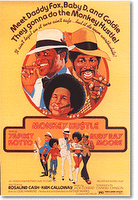
Monkey Hustle
(1977, 90 minutes)
Starring Yaphet Kotto, Rosalind Cash, Rudy Ray Moore, Kirk Calloway, Randy Brooks, Debbi Morgan, Carl Crudup, Fuddle Bagley, Thomas Carter, Donn Harper, Frank Rice, Lynn Caridine, Patricia McCaskill, Lynn Harris, Duchyll Smith, Steven Williams.
Written by Charles Johnson, from a story by Odie Hawkins.
Directed by Arthur Marks.
Two years earlier than this, director Marks had helmed two other blaxpo pictures, Bucktown with Pam Grier and Fred Williamson and Friday Foster with Grier and Kotto. Despite belonging to the same genre, these were two rather different films. Bucktown was a rough and mean story of corruption and almost Shakespearean betrayal, while Friday Foster, based on a comic strip (imagine a black Brenda Starr and you’ll pretty much have the idea), had a much lighter tone. Foster also differed from Bucktown in as much as, while still fairly violent, it tempered the brutality by scattering bits of humor throughout. As if this weren’t variety enough, the following year saw the director making J. D.’s Revenge, a blaxpo horror film about a man possessed by a murdered gangster. Marks may have weighed in on these efforts and decided he liked the light touch of Foster, so much so that he would consider going even further in that direction. At least that seems to be what was on his mind when he made this likeable enough, but strangely empty comedy about a Chicago neighborhood populated almost exclusively by smalltime hustlers.
There’s a bit of a plot about a block party the locals throw to protest the building of a freeway through the neighborhood, but most of the film is taken up by the little scams perpetrated by the characters, mostly on each other. (I don’t know if this is supposed to be some kind of statement or if it’s just a comic device). Kotto plays Big Daddy Foxx, a kind of father figure to the up-and-comers, and he describes what they do for a living as the ‘monkey hustle’ of the title. As fun as all of the scheming is, it leaves precious little time for anything else, and as a result, the characters are so thinly drawn, it’s hard to care about them on anything more than the most perfunctory level. (Interestingly enough, though not well-developed either, the most diverse character is The Black Knight (Rice), the local cop, who is portrayed alternately as a law enforcer, a co-conspirator in the scams, a bumbling fool easily tricked by the young hustlers and, ultimately, a part of the stolid community facing down ‘the man’. One almost wonders if screenwriter Charles Johnson was merely trying to cover all bases with one character, given the sharply divided opinion of the time regarding police officers.)
The cast is not to blame for the rather hollow tone as they all do their best. The wonderful Kotto is as engaging as ever and genre fave Moore (Dolemite), while not given that much to do, still manages to add some flamboyance to the proceedings.
It has been one of my own little pet musings to imagine what might have resulted if the people behind this genre had tried to make a film using the ideologies of the Italian post-war neo-realist movement. Given the over-the-top nature of much blaxploitation and the definitively anti-style stance of neo-realism, it might have resulted in disaster, yet on the other hand, it also might have provided a more contemplative portrait of urban black life than these films tend to. This is actually one place where this film succeeds a bit more than its counterparts. You do get a real feeling of the community at large, which incidentally makes the slightly hackneyed rally scene at the end easier to take. But this is a case of seeing the forest despite the trees and I can’t help but wonder how much more poignant it would have been had we had really solid characters to attach ourselves to.
This will not satisfy those looking for blaxploitation’s trademark sex and violence quotient, but it does stand as an unusual variation. Pity it couldn’t have been a more thoughtful one.
Go back to Plate O' Shrimp


<< Home